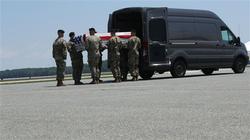 First they binned the Intermediate-Range Nuclear Forces (INF) Treaty with Russia. Now war-party Washington plans to deploy new intermediate-range missiles in West Asia.
First they binned the Intermediate-Range Nuclear Forces (INF) Treaty with Russia. Now war-party Washington plans to deploy new intermediate-range missiles in West Asia. RNA - US Defence Secretary Mark Esper says he doesn’t know where and this shouldn’t take us by surprise: “Washington is no longer bound by the INF Treaty. We would like to deploy a capability sooner rather than later.”
Although the Pentagon chief hasn’t specified where the US intends to deploy these weapons, it’s not that hard to speculate. The stated idea is to compete with China everywhere, which is the second arm producer in the world. Esper insists: “And I want to say is that 80 percent of their inventory is INF range systems. So that should not surprise that we would want to have a like capability.”
These arguments should worry the international civil society and the global anti-war movement. They symbolise the twisted morality of those for whom conflict remains the natural state of human existence. The intended message is certainly received loud and clear in many capitals across the region.
Whatever this is, the plan is in defiance of international law and ethical statutes in pursuit of such weapons deployments. It’s not hard to understand given the enormous profits American businesses and the cult of military-industrial complex will be able to rake in and its potential of reviving a new arms race.
Together with the Trump White House, the War Party wants permanent distrust and conflict to drag on without end in West Asia. Previously talking up how the wars in Afghanistan and Syria can’t last forever, President Donald Trump now wants troops to stay in these countries forever, which is as close to a recipe for permanent war and occupation as one can get.
That seems to also be the case in Iraq and Yemen, where Trump says the US will continue to support the war against the Yemeni army and Ansarullah or that US troops will remain in Iraq. It might just be that the US will never get around to leaving the region at peace with itself. In other words, when it comes to the Pentagon, there is no such thing as withdrawal and over.
According to Fars News Agency, the plan has coincided neatly with the Senate’s recent resolution expressing opposition to leaving the Middle Eastern countries. For all the war paths that might be taken again in this terrible new situation, a recent Pentagon report suggests that, “Even if a successful political settlement with the Taliban emerges, the US military should still maintain a robust capability for the foreseeable future in Afghanistan.”
In that mind-boggling context, the same assumption apparently exists for the rest of West Asia, where Esper insists, “That should be no surprise because we have been talking about that for some time now.” This is where Washington’s forever war lobby and self-styled triumphalist warriors insist US troops would also be staying more or less forever. The phoney justification is that their troops and missile deployments would allow them to “contain” Iran, Russia and China.
By every conceivable indicator, Washington’s trigger-happy officials and resource-war planners have every intention to remain on the path of arms trade in West Asia. And to one degree or another, they all know that triggering a large-scale, state-sanctioned arms race is unlawful per international law.
No regional state should ever adhere to this irredeemably flawed and deeply harmful practice in US foreign policy. It would bring no peace or stability by even the loosest definition of the word. Countries in the region should remain assertive and defy American meddling in their affairs, and instead invest more in regional cooperation and dialogue.
847/940